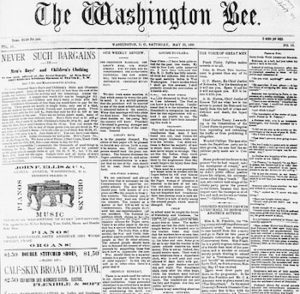
*The Washington Bee was founded on this date in 1882. It was a Washington, D.C.-based American weekly newspaper primarily catering to and read by Blacks.
Throughout almost all of its 40 years in publication, it was edited by Black lawyer-journalist William Calvin Chase. The Bee's publication history coincided with a two-generation period of American history during which the politically reactionary Redeemers sharply constrained the political roles of Blacks. Successful professional Black individuals, such as editor Chase, faced constant political battles to maintain the limited gains made in previous generations. Chase's editorials initially criticized accommodating Black leaders, such as Booker T. Washington, but later made peace with the influential Tuskegee leader.
The Bee shared the Washington, D.C. market with a rival weekly, the Colored American. Washington's private papers indicate that he and his network financially supported both news sheets. The Bee's nameplate slogan was "Sting for Our Enemies – Honey for Our Friends," and according to a Library of Congress critic, "the Bee represented the Republican attitudes of its editor, although Chase did not hesitate to criticize Republican Party leaders when he thought they were on the wrong side of an issue." The Bee′s circulation numbers are unknown but were never large; the highest figure given is 9,700 in 1922.
That was the year the Bee ceased publication, unable to survive the death of its editor in 1921. The Washington Bee was a six-column broadsheet typical of the newspapers of its day. In May 1886, the Bee was priced at five cents for a single issue, with a one-year subscription costing $2.00.
The Bee′s acceptance of advertising necessitated active acceptance of the overall social customs of its day, including residential segregation. For example, in a June 1893 display advertisement, developers in Bowie, Maryland, touted what they called "The first opportunity offered colored people to secure Homes on Weekly payments of 50 cents a week or $2 per month – 1000 Lots for Sale – in the city of Bowie, State of Maryland." Only a 20-minute ride from Washington. Double track. Twenty-two trains stop daily. The fare to and from Washington is only six cents by a commutation ticket.
Even though Black residents of Washington did not have a formal voice in national affairs, as the District of Columbia lacked congressional representation and votes in the presidential Electoral College, Chase and the Bee could speak out informally. The Library of Congress believes that the Bee was "one of the country's most influential African American newspapers."
The Bee wielded its influence through carefully worded editorial content. The Washington Bee would sometimes accord significant coverage to news stories involving crime, including criminal acts that did not involve the Black community. Examples include a June 1893 Bee lead paragraph describing the Lizzie Borden case: The trial of one of the most sensational murder cases of modern times began on Monday at Fall River, Mass. It continued publication, with gaps in 1893 and 1895, until 1922, shortly after editor Chase's death. The Library of Congress has archived issues of the Bee from August 2, 1884, onward until the cessation of publication in 1922.